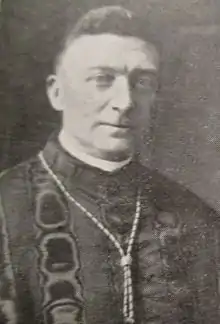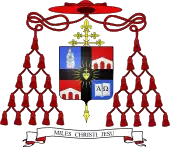Achille Liénart | |
|---|---|
| Bishop Emeritus of Lille | |
 Cardinal Liénart in February 1939. | |
| Church | Roman Catholic Church |
| Diocese | Lille |
| See | Lille |
| Appointed | 6 October 1928 |
| Term ended | 14 March 1968 |
| Predecessor | Hector-Raphael Quilliet |
| Successor | Adrien-Edmond-Maurice Gand |
| Other post(s) | Cardinal-Priest of San Sisto (1930-73) |
| Orders | |
| Ordination | 29 June 1907 by Léon-Adolphe Amette |
| Consecration | 8 December 1928 by Charles-Albert-Joseph Lecomte |
| Created cardinal | 30 June 1930 by Pope Pius XI |
| Rank | Cardinal-Priest |
| Personal details | |
| Born | Achille Liénart 7 February 1884 |
| Died | 15 February 1973 (aged 89) Lille, France |
| Buried | Lille Cathedral |
| Parents | Achille Philippe Hyacinthe Liénart Louise Delesalle |
| Previous post(s) |
|
| Alma mater | |
| Motto | Miles Christi Jesu |
| Coat of arms | |
| Styles of Achille Liénart | |
|---|---|
 | |
| Reference style | His Eminence |
| Spoken style | Your Eminence |
| Informal style | Cardinal |
| See | Lille (emeritus) |
Achille Liénart (French: [aʃil ljenaʁ]; 7 February 1884—15 February 1973) was a French cardinal of the Roman Catholic Church. He served as Bishop of Lille from 1928 to 1968, and was elevated to the cardinalate in 1930.
Biography
Born in Lille to a bourgeois family of cloth merchants, Liénart was the second of the four children of Achille Philippe Hyacinthe Liénart and Louise Delesalle. He studied at College Saint-Joseph, the Seminary of Saint-Sulpice in Paris, the Institut Catholique de Paris, Collège de Sorbonne, and the Pontifical Biblical Institute in Rome. He was ordained to the priesthood on 29 June 1907, and then taught at the Seminary of Cambrai until 1910, and then at Lille until 1914. During World War I Liénart served as a chaplain to the French Army, and did pastoral work in his hometown from 1919 to 1928. As a priest, he championed social reform, trade unionism, and the worker-priest movement.[1]
On 6 October 1928 he was appointed Bishop of Lille by Pope Pius XI. Liénart received his episcopal consecration on the following December 8 from Bishop Charles-Albert-Joseph Lecomte of Amiens, with Bishops Palmyre Jasoone and Maurice Feltin serving as co-consecrators, in Tourcoing. He was created Cardinal Priest of S. Sisto by Pius XI in the consistory of 30 June 1930. By coincidence, one of the first priests he ordained, on 21 September 1929, was Marcel Lefebvre.[2] Liénart's and Lefebvre's paths were intertwined during the following years, even serving both on the Central Preparatory Commission for the Second Vatican Council. And it was Liénart who, as cardinal, in 1947 consecrated Lefebvre (who had been appointed as Apostolic Vicar of Dakar in Senegal), to the episcopate.

During the German occupation, Liénart initially supported Philippe Pétain, but was greatly opposed to Nazi Germany.[3]
Liénart, who participated in the 1939 papal conclave, was elected president of the French Episcopal Conference in 1948, representing the Catholic Church in France, and remained in that post until 1964. An elector in the 1958 papal conclave, he was named the first territorial prelate of Mission de France on 13 November 1954 and later resigned from this post in 1964.
Liénart had a nickname of a "Red Cardinal" because of his support for the left-wing worker-priest movement and Catholic trade unions, and he strongly promoted social justice within the Church.[4] Seeking collaboration with workers' associations and pursuing dialogue with socialist and communist trade unions, French worker-priests under Liénart would earn the respect of various left-wing movements, including the Marxist ones. Entering dialogue with these priests, a French communist activist remarked in 1954: "You are Christian and a priest; I am a Communist. But I say we are brothers. And when you tell me by my conduct that I am Christian, I respond to you that I would be even more so if the church was what you wished it to be." Liénart continued to maintain the movement even after Vatican took action against worker-priests in 1953, making sure that they could stay active "through special dispensations and broad interpretations of the papal wishes". Vatican would reverse its decision and embrace the movement in 1962.[5]
During the Spanish Civil War, Liénart also organized help and supplies to Basque Country and helped Basque refugee escape to France. Liénart was sympathetic to the Basque independence movement and praised their dedication to the Catholic faith, arguing that it is of utmost importance to help Basque peoples protect their traditions, language and culture. He coordinated the effort of Catholic and secular trade unions to form a pro-Basque and anti-fascist alliance; and endorsed the announcement of the local Catholic union leader Maurice Dignac, who stated: "The Basque refugees in France will not be able to arrive at the feet of the Holy Father, as the Spanish refugees in Italy may. These thousands of Basque Catholics pursued by the rebels, plundered by the Crusaders, without homes or property, will not be able to reach the Father of Christianity: the Government of the fascist will stop them at the border.” In his pastoral letter, Liénart similarly wrote: "Basques are desolate; Christian charity asks us to assist them. Most of them are our brothers in faith: this is one more reason to help them."[6]
French right-wing perfume magnate François Coty accused Liénart of "aiding and abetting communism", given his support for trade unions and willingness to negotiate with socialist movements. In his book Catholic Labor Movements in Europe Social Thought and Action, 1914–1965, Paul Misner called the cardinal "a champion of Christian labor and the JOC from the beginning of his episcopate", arguing that his close cooperation and endorsement of unions had a profound impact on social Catholicism in France and its relations with socialist movements. Pastoral letters by Liénart were "treated like a social encyclical" in France, and amongst the French left, his actions and willigness to cooperate "deprived their Catholic opponents of any objections in principle".[7]
An active participant of the Second Vatican Council (1962–1965), Liénart was a leading liberal voice at the council and sat on its Board of Presidency. When the Roman Curia, composed predominantly of conservative prelates, issued a list of nominees for the members of the council's commissions, Liénart objected that nothing of the nominees' qualifications were included.[8][9] Liénart, assisted by Cardinals Bernardus Johannes Alfrink and Giovanni Colombo, delivered one of the closing messages of the council on 8 December 1965.[10] He was also one of the cardinal electors in the 1963 papal conclave, which selected Pope Paul VI.
Liénart resigned as Lille's bishop on 14 March 1968, after forty years of service. He lost, on January 1, 1971, the right to participate in a conclave, having reached the age of 80. After his death at 89, he was buried in the Cathédrale Notre-Dame-de-la-Treille.
References
- ↑ Time. "Recent Deaths". February 26, 1973.
- ↑ Ordained priest at Lille, France, by Msgr Achille Liénart, Bishop of Lille, on 21 September 1929 Archbishop Marcel Lefebvre - Useful Information Archived 2004-07-03 at the Wayback Machine Society of Saint Pius X, District of Great Britain
- ↑ Leaders of the Church During the Vichy Regime. Cardinal Achille Lienart Archived February 20, 2007, at the Wayback Machine
- ↑ McFadden, Robert D. (16 February 1973). "Cardinal Lienart, Who Backed Worker‐Priest Movement, Dies". nytimes.com.
- ↑ Arnal, Oscar L. (1984). "A Missionary "Main Tendue" toward French Communists: The "Témoignages" of the Worker-Priests, 1943-1954". French Historical Studies. Duke University Press. 14 (3): 529–556.
- ↑ Irujo, Xabier (2012). Expelled from the Motherland: The Government of President Jose Antonio Agirre in Exile, 1937–1960. Basque Politics Series. Translated by Watson, Cameron J.; Ottman, Jennifer. Center for Basque Studies. p. 71. ISBN 978-1-935709-20-6.
- ↑ Misner, Paul (2015). Catholic Labor Movements in Europe Social Thought and Action, 1914–1965. Washington D. C.: The Catholic University of America Press. pp. 115–117. ISBN 978-0-8132-2753-5.
- ↑ Time. "The Council Opens". 19 October 1962.
- ↑ Lefebvre, Marcel. They Have Uncrowned Him. 4th ed. Kansas City: Angelus Press, 1988.
- ↑ Christus Rex. To Rulers Archived 2007-04-03 at the Wayback Machine
External links
- Catholic-Hierarchy Profile [self-published]
- Cardinals of the Holy Roman Church Profile